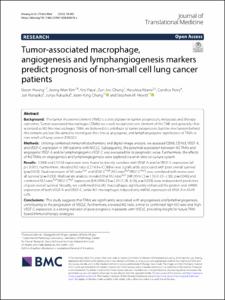Tumor-associated macrophage, angiogenesis and lymphangiogenesis markers predict prognosis of non-small cell lung cancer patients
- Keimyung Author(s)
- Hwang, Il Seon
- Department
- Dept. of Pathology (병리학)
- Journal Title
- Journal of Translational Medicine
- Issued Date
- 2020
- Volume
- 18
- Keyword
- Tumor-associated macrophage; CD163+/CD68+ ratio; Vascular endothelial growth factor; Angiogenesis; Lymphangiogenesis; Non-small cell lung cancer; Prognosis
- Abstract
- Background:
The tumor microenvironment (TME) is a critical player in tumor progression, metastasis and therapy outcomes. Tumor-associated macrophages (TAMs) are a well-recognized core element of the TME and generally characterized as M2-like macrophages. TAMs are believed to contribute to tumor progression, but the mechanism behind this remains unclear. We aimed to investigate the clinical, angiogenic, and lymphangiogenic significance of TAMs in non-small cell lung cancer (NSCLC).
Methods:
Utilizing combined immunohistochemistry and digital image analysis, we assessed CD68, CD163, VEGF-A, and VEGF-C expression in 349 patients with NSCLC. Subsequently, the potential association between M2 TAMs and angiogenic VEGF-A and/or lymphangiogenic VEGF-C was evaluated for its prognostic value. Furthermore, the effects of M2 TAMs on angiogenesis and lymphangiogenesis were explored via an in vitro co-culture system.
Results:
CD68 and CD163 expression were found to directly correlate with VEGF-A and/or VEGF-C expression (all p < 0.001). Furthermore, elevated M2 ratio (CD163+/CD68+) was significantly associated with poor overall survival (p = 0.023). Dual expression of M2 ratiohigh and VEGF-Chigh (M2 ratiohighVEGF-Chigh) was correlated with worse overall survival (p = 0.033). Multivariate analysis revealed that M2 ratiohigh [HR (95% CI) = 1.53 (1.01–2.33), p = 0.046] and combined M2 ratiohighVEGF-Chigh expression [HR (95% CI) = 2.01 (1.28–3.16), p = 0.003] were independent predictors of poor overall survival. Notably, we confirmed that M2 macrophages significantly enhanced the protein and mRNA expression of both VEGF-A and VEGF-C, while M1 macrophages induced only mRNA expression of VEGF-A in A549 cells.
Conclusions:
This study suggests that TAMs are significantly associated with angiogenesis and lymphangiogenesis, contributing to the progression of NSCLC. Furthermore, elevated M2 ratio, similar to combined high M2 ratio and high VEGF-C expression, is a strong indicator of poor prognosis in patients with NSCLC, providing insight for future TAM-based immunotherapy strategies.
- Keimyung Author(s)(Kor)
- 황일선
- Publisher
- School of Medicine (의과대학)
- Citation
- Ilseon Hwang et al. (2020). Tumor-associated macrophage, angiogenesis and lymphangiogenesis markers predict prognosis of non-small cell lung cancer patients. Journal of Translational Medicine, 18, 443. doi: 10.1186/s12967-020-02618-z
- Type
- Article
- ISSN
- 1479-5876
- Source
- https://translational-medicine.biomedcentral.com/articles/10.1186/s12967-020-02618-z
- Appears in Collections:
- 1. School of Medicine (의과대학) > Dept. of Pathology (병리학)
- 파일 목록
-
-
Download
 oak-2020-0767.pdf
기타 데이터 / 1.7 MB / Adobe PDF
oak-2020-0767.pdf
기타 데이터 / 1.7 MB / Adobe PDF
-
Items in Repository are protected by copyright, with all rights reserved, unless otherwise indicated.